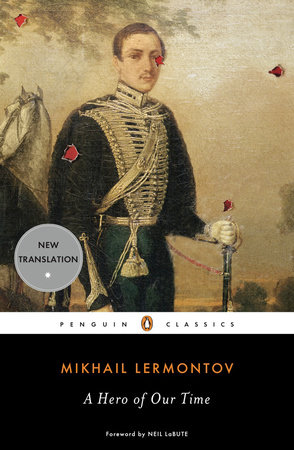A Hero of Our Time Reader’s Guide
By Mikhail Lermontov


INTRODUCTION
Passing through the snow-capped Caucasus Mountains in the 1830s, a nameless traveler seeks to pass the time by encouraging his recent acquaintance, a middle-aged army officer named Maxim Maximych, to recollect some anecdotes from his military service. Without realizing it, the traveler is about to become immersed in the haunting, ironic life story of the officer’s former comrade-in-arms, a charismatic but strangely aloof young man named Grigory Alexandrovich Pechorin. Seen first through the memories of the aging officer, then briefly through the narrator’s own eyes, and finally at length through selections from his own candid and introspective journals, Pechorin dominates the action and outlook of the groundbreaking first and only novel of Mikhail Lermontov, A Hero of Our Time.
Inspired by the writings of Lord Byron and Lermontov’s great countryman Alexander Pushkin, A Hero of Our Time stands as the first significant prose novel in Russian literature. In its protagonist, Pechorin, Lermontov creates an exemplar of brooding, alienated youth whose depiction many writers have striven to imitate but few have ever surpassed. Guided by Lermontov’s frank narration, the reader follows Pechorin through a series of dramatic adventures, in which gamblers, smugglers, Circassian guerrillas, and pistol-wielding duelists all have their parts to play. Page by page, with unerring psychological discernment, Lermontov reveals his main character as a masterful manipulator of both men and women. He shows us a man whose love is born from narcissism, whose malice arises from boredom and disaffection, and whose deepest thoughts arise from a sincere desire for self-knowledge—a knowledge that perpetually evades him.
With callous indifference, Pechorin pursues pleasure and excitement at the grievous expense of others, as his exploits shatter the lives of a series of fascinating characters: Bela, the innocent Circassian maiden whom Pechorin buys for the price of a horse; Grushnitsky, the lovestruck cadet whose romantic hopes are pinned to Princess Mary Ligovsky, the frail, beautiful young woman whose affections Pechorin both invites and scorns. Astonished by his own destructive power, Pechorin tries to comprehend both his motivations and his destiny, to no avail. In his sweeping nihilism, Pechorin both fascinates and repels. He is both a despicable rogue and, in the words of Maxim Maximych, “a wonderful fellow . . . only a little strange” (p. 11).
Although A Hero of Our Time plainly recalls the Byronic antiheroes of the earlier part of the nineteenth century, it also lent inspiration to the masterpieces of Dostoevsky and Tolstoy and brilliantly anticipated the existential fiction of the twentieth century. A bitter satire of its own age as well as a timeless reflection on the very possibility of heroism in an absurd, dislocated universe, A Hero of Our Time is a truly indispensable work in the literature of Russia and the modern world.
Born in 1814, Mikhail Yurievich Lermontov lost his mother to tuberculosis when he was not yet three years old and was raised principally on the country estate of his wealthy maternal grandmother. Well trained as a singer, pianist, and violinist, he became fascinated at an early age with the rhythms and melodies of language and showed early promise as a poet. A proficient translator of both English and German, he absorbed important creative influences from the works of Byron and Schiller, as well as those of Pushkin. After two years at Moscow University, Lermontov enrolled in St. Petersburg’s School of Cavalry Cadets, from which he emerged at the age of twenty with a rank equivalent to that of second lieutenant. After a period of dissipation and creative inactivity, Lermontov burst onto the Russian literary scene in 1837 with “Death of a Poet,” a poem written in response to the death of Pushkin. Following a political controversy, Lermontov was assigned to a regiment in the Caucasus, where he conceived the inspiration for his best-remembered work, A Hero of Our Time. Following another two-year sojourn in St. Petersburg, during which he wrote A Hero of Our Time, Lermontov was again exiled to the Caucasus in 1840. The following year, a few months shy of his twenty-seventh birthday, Lermontov was challenged to a duel by a fellow officer, Nikolay Martynov. Declaring that he had no desire “to fire at a fool,” Lermontov made no attempt to shoot. Martynov shot him through the heart.
Just for joining you’ll get personalized recommendations on your dashboard daily and features only for members.
Find Out More Join Now Sign In